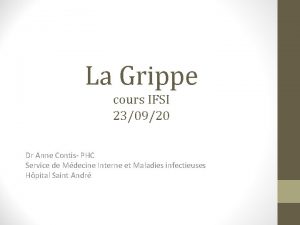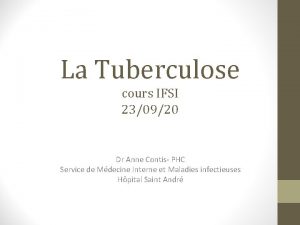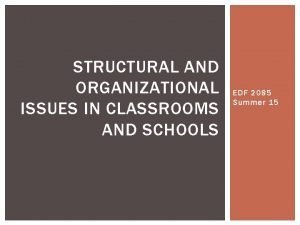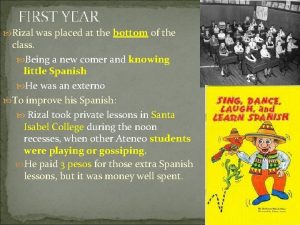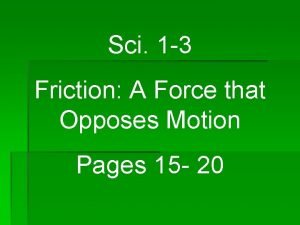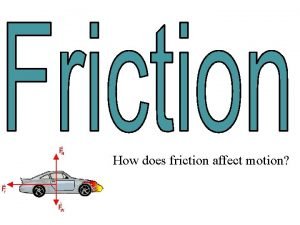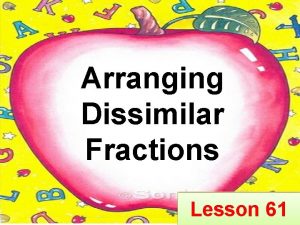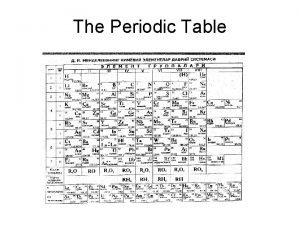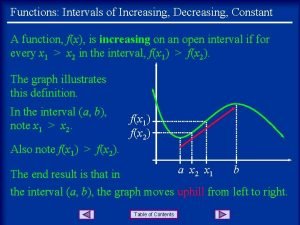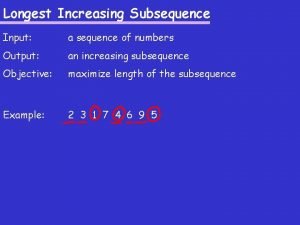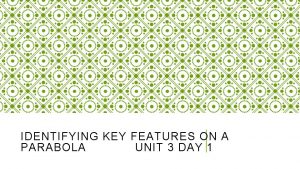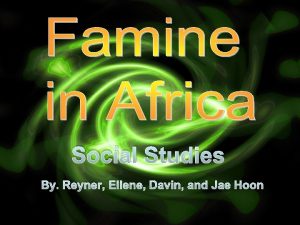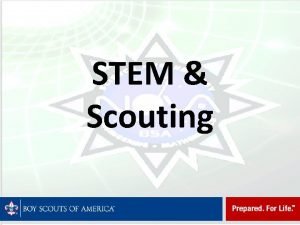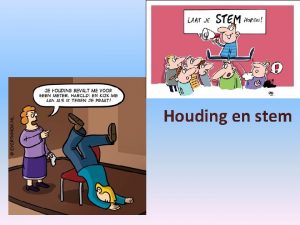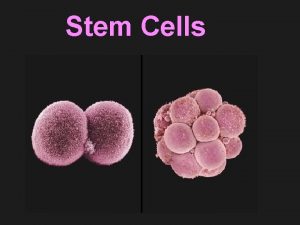INCREASING RETENTION OF STEM STUDENTS Ellene Tratras Contis
















- Slides: 16

INCREASING RETENTION OF STEM STUDENTS Ellene Tratras Contis, Chemistry, Director Kathy Stacey, Communications, Media, & Theatre Arts, Co. PI Claudia Petrescu, Public Administration, Project Evaluator Eastern Michigan University Ypsilanti MI 48197 Tenth International Research Conference on Service-Learning and Community Engagement Crowne Plaza at Historic Union Station, Indianapolis, IN October 2010

THE CREATIVE SCIENTIFIC INQUIRY EXPERIENCE (CSIE) PROGRAM: INTRODUCTION § § Is a program involved in retaining and increasing the number of STEM graduates. Is an innovative approach that includes: § § § faculty professional development student connectedness to science and mathematics through academic servicelearning curricular reform

THE CREATIVE SCIENTIFIC INQUIRY EXPERIENCE (CSIE): THE CONCEPT MODEL

CSIE: THE LOGIC MODEL

CSIE: FAST FACTS Is targeting students who are in their first two years of STEM curriculum ü Since fall 2006, 313 students have participated in the CSIE Program at Eastern Michigan University— including 63 students in the 2009 -2010 academic year. ü Students Characteristics • Gender— 53% Female, 47% Male, and less than 0. 3% not reported • Race/Ethnicity— 67% white, 12% Black, 5% Asian, 4% Hispanic, less than 0. 3% Native American, and the remaining 11% not reported. • SES Status— 27% First Generation, 46% Pell Eligible, and 3% Veteran Since 2006, the CSIE Program has retained or graduated 58% of CSIE students in STEM programs at EMU. ü This represents approximately 10% of STEM degrees conferred in the past three years (July 2007 -April 2010)

CURRICULAR INNOVATIONS 2+1 Clusters Interdepartmental BIOL 110 + CHEM 121/3 + CSIE 177 PHY 100 + MATH 108 + CSIE 177 BIOL 301 + PHIL 223 + CSIE 277 ESSC 212 + ASTR 205 + CSIE 277 Intradepartmental CHEM 281 + CHEM 371 + CSIE 377 Stand-alone Seminars CSIE 377: Science Olympiad Coaching Clinic CSIE 177 L: Scoop on Poop- Groundwater Studies (AS-L)

ACADEMIC SERVICE - LEARNING Ø Complements the other components of the Program (faculty development, curriculum innovation) Examples: Toxic Algae: Cyanobacteria in Ford Lake Scoop on Poop/Groundwater Studies Great Lakes GLERL

CSIE: EVALUATION

EVALUATION METHODOLOGY Pre- and Post-Survey • Administered to both CSIE and Non-CSIE students (control group) in Fall and Winter semesters • The survey is build around the CSIE experience constructs Focus group with faculty and students (2008) Number of respondents (2009 -2010 evaluation): CSIE participants (n = 30) who completed and consented to both the Pre- and Post-Surveys Traditional participants (n = 81) who responded and consented to both the surveys. To address Type II error: a proportional weight was applied throughout this analysis the sample sizes become equal for both the CSIE group and the Traditional group (n = 55. 5).

DATA ANALYSIS 1. Analysis of Change within Group: A series of paired sample t-tests were conducted to determine if the concepts had a statistically significant change within the CSIE and Traditional groups between the Pre- and Post-Surveys Hypothesis: There is a change in the mean scores on the constructs and questions from Pre to Post-Surveys for the CSIE and Traditional groups 2. Analysis by Group: A series of independent sample t-tests were conducted to determine if the reported value of the concepts had a statistically significant difference between the CSIE and Traditional groups on the Pre- and Post. Surveys Hypothesis: There is a difference in the mean scores on the constructs between the CSIE and the Traditional groups in the Pre- and Post. Surveys. 3. Analysis of Open Ended Questions


FINDINGS ON THE CONSTRUCTS FROM THE PRE- AND POST-SURVEYS WITHIN GROUPS (2009 -201 O evaluation report): EMU Experience: ü ü The CSIE students reported a higher opinion of their experiences at EMU. Traditional students reported a lower opinion of their experiences at EMU. Habits of Mind: The CSIE and Traditional students reported a higher opinion of their habits of approaching, organizing, analyzing, processing, and solving science and mathematics problems as a result of conditions created by CSIE experiences. Community Interaction: The CSIE students reported an improved opinion of their interaction with the community. Traditional students reported a lower opinion of their interaction with the community.

FINDINGS ON THE CONSTRUCTS FROM THE PRE- AND POSTSURVEYS BETWEEN GROUPS (2009 -201 O evaluation report): ü EMU Experience: At the beginning and end of the semester, CSIE students had a statistically significant higher opinion of their EMU Experience than did Traditional students. ü Habits of Mind: ü ü ü At the beginning of the semester, CSIE students reported a higher mean on Habits of Mind than did Traditional students. At the end of the semester, CSIE students reported a statistically significant higher opinion of their habits of approaching, organizing, analyzing, processing, and solving science and mathematics problems than did Traditional students. Community Interaction: At the beginning and end of the semester, CSIE students had a statistically significant higher opinion of their interaction with the community than did Traditional students.

OVERALL CSIE OUTCOMES: IMPACT ON STUDENTS CSIE students possess significantly higher potential of persisting CSIE students possess significantly higher confidence in graduating CSIE students attribute success to faculty encouragement, advice, and interactions

OVERALL CSIE OUTCOMES: IMPACT ON FACULTY Faculty shared in Focus Groups that CSIE: • Encourages curricular innovations • Builds learning communities among faculty, students and community partners • Creates strong student-faculty relationships • Provides: v More “appreciation” from students v Stronger student engagement in activities v More/better feedback from students in labs v Opportunity to see interdisciplinary connections with courses outside own academic department

THANK YOU To learn more about the Creative Scientific Inquiry Experience Program visit www. emich. edu/csie Funded by the National Science Foundation STEP Type I Program DUE #0525514
 Anne contis
Anne contis Anne contis
Anne contis Students retention
Students retention Rizal champion of filipino students
Rizal champion of filipino students Speed and velocity venn diagram
Speed and velocity venn diagram Increasing friction
Increasing friction Bulk-reducing industry example
Bulk-reducing industry example Increasing friction
Increasing friction Increasing cost industry supply curve
Increasing cost industry supply curve Rays chart
Rays chart Find the value of 5 8/9 + 3 5/6
Find the value of 5 8/9 + 3 5/6 Increasing atomic radius
Increasing atomic radius The grasshopper and the cricket summary
The grasshopper and the cricket summary Atoms in increasing size
Atoms in increasing size Increasing and decreasing intervals
Increasing and decreasing intervals Longest increasing subsequence
Longest increasing subsequence Identify the end behavior
Identify the end behavior
